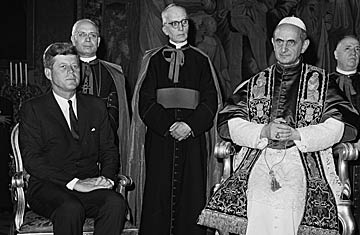
July 02, 1963: Pope Paul receives President John. F Kennedy in the Vatican City
(3 of 4)
JAMES A. PIKE, Protestant Episcopal Bishop of California: "Any argument which would rule out a Roman Catholic just because he is a Roman Catholic is both bigotry and a violation of the constitutional guarantee of no religious test for public office."
PAUL TILLICH, Harvard theology professor: "I believe the time must come in which America must take the risk of having a Catholic candidate. Every election is a risk. Nixon would be a risk for other reasons."
JOHN C. BENNETT, dean of the faculty at Union Theological Seminary: There exists a "Protestant underworld that stirs up undisguised hatred of Catholics. What kind of a country do these Protestants want—a country in which 40 million citizens feel that they are outsiders?"
The Peale-Poling manifesto was also swiftly condemned by the New York
Board of Rabbis, representing 700 Orthodox, Conservative and Reform rabbis.
Said its president. Rabbi David I. Golo-vensky: "Voting for a presidential candidate because he is a Catholic or vot ing against him because he belongs to the Catholic faith is a sinister betrayal of the fundamental precept of American democracy." In the influential Jesuit weekly America, the Rev. John Courtney Murray, a front-rank Catholic theologian, said that "the oldest American prejudice. anti-Catholicism, is as poisonously alive today as it was in 1928, or even in the 1840s. My chief hope is that old Catholic angers will not rise. Now is the time for the tra dition of reason, which is the Catholic tradition, to assert itself."
Nuances & Traps. Jack Kennedy's headquarters rolled out tens of thousands of copies of Kennedy's major statements on the religious issue, emphasizing that "the separation of church and state is fundamental to our American concept and heritage and should remain so." While whistle-stopping through California, Kennedy hit the issue head on. "I do not accept the view that my church would place pressures on me," he said. "The great struggle today is between those who believe in no God and those who believe in God." He also accepted an invitation to address the Greater Houston Ministerial Alliance—in an eye of the anti-Catholic storm—and then submit to a televised question period this week.
Dick Nixon was in a tighter bind. While the religion issue could win him inroads in the South and Midwest, it could lose him the big Northern states—and the election —by welding the many Nixon-disposed Catholics of the cities and suburbs into a pro-Kennedy voting bloc. But there were nuances and traps of all kinds, for all sides, in the religion issue, and both Republicans and Democrats knew it.
*Kennedy's side of the story: "A few days before the event, I learned that I was to be 'the spokesman for the Catholic faith.' I was not being invited as a former member of the armed services or as a member of Congress, or as an individual. I further learned that the memorial was to be located in the sanctuary of a church of a different faith. This is against the precepts of the Catholic Church. Because of this fact, the Archdiocese of Philadelphia was unable to support the drive. Therefore, I felt I had no credentials to attend in the capacity in which I had been asked."
